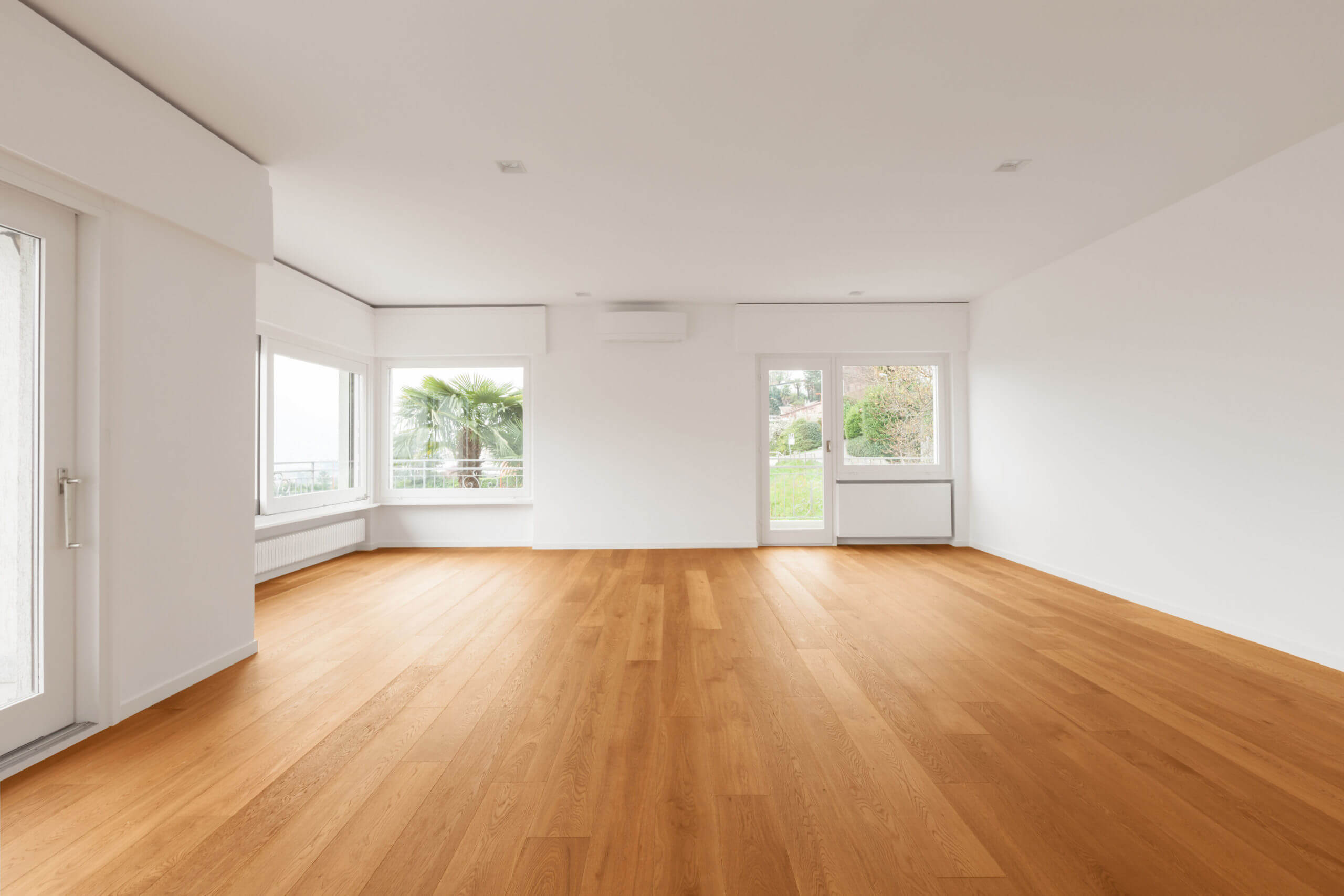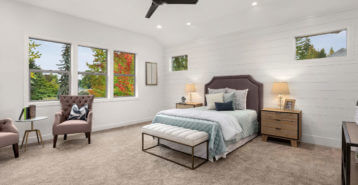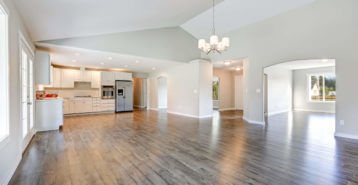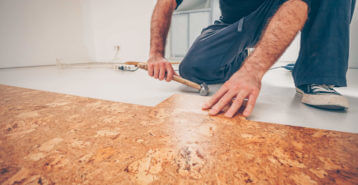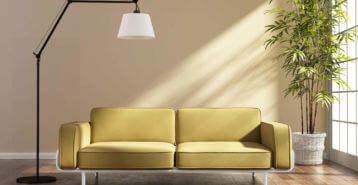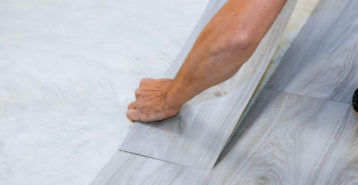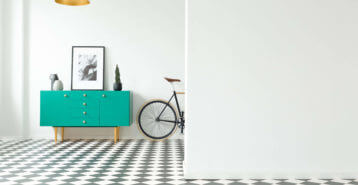Hardwood Flooring Cost Overview
It’s hard to beat the natural beauty and allure of hardwood flooring. Hardwood flooring comes in a wide range of colors, grain patterns, plank sizes, and wood species, so it is typically easy to find a style that adds classic appeal to your home’s interior. Before installing, it is important to understand typical hardwood floor costs. Continue reading to learn more about the cost to install hardwood floors, installation factors, pros and cons, and more.
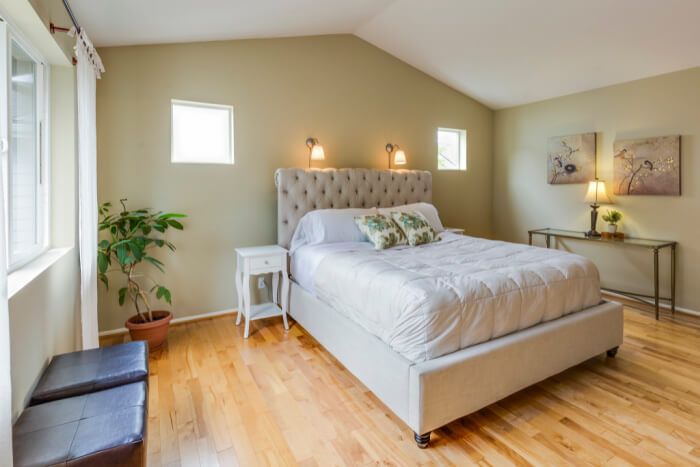
How Much Does Hardwood Flooring Cost?
Across the U.S., most homeowners pay between $6 and $18 per square foot installed for new hardwood floors, including both materials and professional labor. Simpler projects with standard domestic species can fall on the lower end of that range, while high-end woods, intricate patterns, or extensive subfloor repairs can push costs toward $20 or more per square foot.
If you look at materials alone, the cost of your hardwood floor installation will vary depending on the type of planks you choose:
- Solid hardwood planks: Typically around $4 to $15 or more per square foot for materials, depending on the species and grade.
- Premium or exotic solid hardwoods: Species such as imported walnut or mahogany often cost $10 to $20+ per square foot for materials.
- Engineered hardwood planks: Often cost about $4 to $12 per square foot for materials, with some budget products starting around $3 per square foot.
Hardwood Flooring Cost by Type
While hardwood flooring generally costs between $6 and $18 per square foot installed, costs can vary greatly by the type of hardwood you choose, the finish, and the overall durability. Higher-cost species, wider planks, and custom stains increase your price, while standard domestic species and straightforward layouts tend to be more budget friendly.
Below is a general guide to the costs associated with different types of hardwood flooring. All prices are given in a range, reflecting the low end (more basic options) to the high end (luxury options), per square foot:
| Hardwood type | Cost per square foot | Quality |
|---|---|---|
| Maple | $6.50 to $11 | Basic |
| Pine | $4.50 to $6.50 | Basic |
| Ash | $9 to $13 | Mid-range |
| Cherrywood | $5 to $15 | Mid-range |
| Imported mahogany | $8 to $18 | High end |
| Imported walnut | $11 to $20 | High end |
Keep in mind that engineered wood flooring is an option if you like the look of hardwood but have a smaller budget to work with or need more stability in areas with changing humidity. Engineered wood looks and feels much like real hardwood. Lower-end engineered hardwood can cost as little as $3 per square foot for materials, with many professionally installed projects landing in the $7 to $15 per square foot range.
The cost to refinish hardwood flooring typically ranges from $3 to $8 per square foot, depending on the condition of the floor, the finish you choose, and local labor rates. Light “screen and recoat” jobs may cost less, while heavy sanding, repairs, or stair refinishing can cost more. Consult with a contractor on the best option for your home’s flooring project.
In addition to refinishing, you may need hardwood floor repairs to keep your floors looking their best. Small repairs — such as replacing a few damaged boards, filling deep gouges, or addressing minor water damage — often range from about $250 to $1,000, depending on the size of the area, the wood species, and how closely the new boards need to match your existing floor. Larger repairs, subfloor issues, or extensive water damage can approach or exceed the cost of installing new flooring in that room, so a local flooring contractor can help you decide whether repair or replacement makes more financial sense.
Hardwood Flooring Installation and Labor Costs
In addition to the cost of hardwood itself, you will also need to factor in labor and installation costs to understand the total price of your project. Below you can explore the most common labor cost components associated with hardwood floor installations:
- Installation: Expect to pay about $3 to $8 per square foot for labor to install hardwood planks, on top of the material cost. Complex installations — such as herringbone or chevron patterns, stair treads, or layouts with lots of cuts and transitions — can run $8 to $10+ per square foot for labor.
- Underlayment: Underlayment materials typically range from about $0.40 to $2.50 per square foot, depending on the type (foam, cork, rubber, or acoustic mats). When labor is included and billed separately, you might see $3 to $5 per square foot for underlayment installation. In many hardwood bids, underlayment is wrapped into the overall per-square-foot cost.
- Trim and molding: Costs for trim, shoe molding, and thresholds can add up. Interior trim installation generally ranges from about $4 to $10 per linear foot, depending on the material, profile, and whether painting or staining is included.
- Old flooring removal and disposal: If you are replacing existing flooring, removal and disposal are often charged per square foot. For most materials, expect $1.50 to $4.50 per square foot, with carpet removal on the lower end and ceramic tile or glued-down hardwood on the higher end.
Remember to ask your local contractor if the price they quote includes installation, underlayment, and trim, or if those are additional line items. Prices can vary significantly by region and contractor, so it’s always best to get three to four quotes. Always check whether old flooring removal and debris disposal are included in the bid.
Keep in mind that while hardwood flooring can be more expensive upfront compared to other flooring options, it is also known for its longevity and its ability to be refinished. That combination of durability and refinishing potential can make hardwood a cost-effective choice over the long term.
7 Factors to Consider Before Installing Hardwood Floors
If the time has come to replace worn or outdated flooring in your home, there are many reasons to consider hardwood over other flooring materials. There are so many options available that it’s important to choose the right kind of hardwood flooring for your needs. Here are some key factors to discuss with your contractor:
Design
Hardwood flooring offers nearly limitless design options since wood species vary by color, grain pattern, and texture. Different types of finishes can also complement the wood’s natural luster, from matte to high-gloss, or hand-scraped and wire-brushed textures.
Plank size
Hardwood planks vary in width, and that size has a tremendous impact on the visual appearance of the flooring once it’s installed. Traditionally, floor planks were milled to 3-inch widths, but wider widths such as 6, 8, 10, and even 12 inches are more commonplace today. Wider planks have fewer seams and can make small rooms and narrow hallways appear more spacious.
Solid or engineered hardwood
Solid hardwood planks are milled from single pieces of wood and have a tongue on one edge and a groove on the other. They are either prefinished at the factory or sanded, stained, and finished on site after installation, and they can typically be sanded and refinished multiple times over their lifespan.
Engineered hardwood is made by gluing together alternating layers of plywood or fiberboard underneath a hardwood veneer. The alternating layers make these planks more dimensionally stable so they expand and contract less with changes in humidity. Many engineered products can be refinished once or twice if they have a sufficiently thick wear layer, but thinner veneers may only be suitable for light screening and recoating rather than full sanding.
Wood species
There are many types of domestic trees harvested for wood flooring. However, the most common include oak, hickory, maple, ash, birch, cherry, and walnut. Each species has different qualities and characteristics such as appearance, grain, and color, as well as varying hardness and durability.
Finish
Plank flooring can be finished in a clear gloss with high or low sheen, or it can be distressed by hand scraping or wire brushing, techniques that change the floor’s visual character and help hide everyday wear.
Durability
Wood’s hardness is rated by an industry standard called the Janka Hardness Test, which measures the amount of force needed to mechanically embed a steel ball into the wood. Red oak, at 1290 on the Janka Hardness Scale, is considered the industry median. Ash (1320), maple (1450), and hickory (1820) exceed that mark. Brazilian cherry is among the hardest commonly used flooring species at 2350 on the Janka Hardness Scale.
Cost
Hardwood flooring can be either moderately expensive or extremely pricey depending on the species you choose. Domestic hardwoods typically cost less than imported exotics. Installation costs usually vary by the complexity of the job. For instance, prefinished planks are typically easier and less labor-intensive to install than unfinished planks that are sanded and finished on site.
Discuss these factors with a flooring contractor prior to beginning your new project to help ensure you stay within budget and fully enjoy the final results.
Advantages
In addition to style and beauty, hardwood floors offer many benefits for homeowners. These include:
- Easy to clean. Like concrete floors, hardwood floors are relatively easy to maintain. Sweeping or vacuuming removes daily dust and dander, while regular damp mopping with a wood floor cleaner can remove any built-up grime or stains. Some hardwood flooring shows streaks, so you may want to follow up with a dry towel after mopping.
- Long-lasting. With proper care and appropriate species selection, hardwood floors can last for decades. There’s a reason why many homes on state historic registers still have their original flooring. To achieve the optimal lifespan, make sure to care for your hardwood floors routinely.
- Hypoallergenic. Wood doesn’t trap dust, dirt, dander, and similar allergens the way carpet can. So long as you routinely clean your floors, you can enjoy fewer allergens circulating in your home.
- Value. Wood floors are an excellent investment. Industry estimates suggest homeowners can often recover around 70% to 80% of their original investment at resale, and hardwood can help a home sell faster and appeal to a wider range of potential buyers.
- Aesthetics. Hardwood flooring’s visual appearance blends seamlessly into both traditional and modern design schemes. You can update area rugs, furniture, and paint colors over time while keeping the same hardwood foundation.
Disadvantages
Hardwood does have some potential drawbacks to keep in mind. A few disadvantages include:
- Cost. Exotic wood species, while beautiful, can make your flooring renovation budget soar, and even top-quality domestic hardwoods come at a premium. Natural hardwood planks are also more labor-intensive to install than many floating or click-together products, which further increases the total cost of new hardwood flooring.
- Noise. Hardwood doesn’t dampen ambient noise like some other flooring options. Area rugs, runners, and acoustic underlayments can help improve a room’s acoustics.
- Damage. Even the hardest wood flooring is susceptible to scuffs, scratches, dings, and dents, especially in high-traffic areas or homes with pets. Hardwood is also prone to water damage. You may need to refinish your hardwood flooring down the road to restore its appearance.
- Limited usage in wet areas. Hardwood floors are a natural fit for most living spaces, hallways, and bedrooms. Although hardwood can be installed in kitchens, powder rooms, and laundry areas, remember that wood and water don’t mix. Leaks or repeated spills from bathtubs, showers, toilets, sinks, dishwashers, and washing machines can cause buckling and warping over time. Replacing even one or two damaged planks can be a challenging repair.
Pre-finished vs. Unfinished Hardwood Planks
When choosing hardwood for your flooring installation, you will have the choice of either pre-finished or unfinished hardwood planks. Both options have their advantages and disadvantages.
Pre-finished hardwood
Pre-finished hardwood planks are stained and sealed at the factory prior to being installed in your home. Any type of hardwood species can be pre-finished. Pre-finished hardwood planks typically allow for a quicker, less messy, and less smelly installation process. They also come with a durable surface that is scratch and stain resistant and can often be refinished when necessary, depending on the thickness of the wear layer. On the downside, pre-finished hardwood may offer fewer custom color and sheen options and typically costs more upfront than unfinished hardwood.
Unfinished hardwood
Unfinished hardwood planks arrive at your home in their natural form, free of any sealant or finishes. You might choose unfinished hardwood if you want a custom stain or finishing system applied on site. Typically, unfinished hardwood is sanded and then sealed with protective finishing in your home during the installation process.
Unfinished hardwood planks may be desirable if you prefer the beautiful, seamless look of minimal micro-bevels between planks. This can result in a very flat floor where boards visually blend together. On the other hand, unfinished hardwood installations take longer to complete, can be messier, and may have more odor during the sanding and finishing stages.
How to Find Local Hardwood Professionals
Wood flooring is one of the most beautiful coverings you can install in your home. However, due to the wide range of products available, choosing the right hardwood flooring can feel intimidating.
Modernize can put you in touch with great flooring contractors in your area who can help you pick out the perfect hardwood for your flooring renovation project and budget, as well as install it correctly.
Compare top-rated flooring pros in your area.
Read real homeowner reviews, explore qualifications, and view promotions. Modernize makes it easy to browse professionals and find one that will be perfect for your project.
